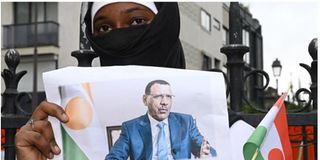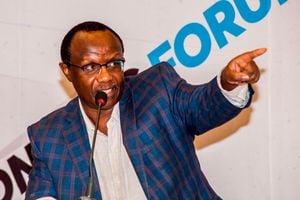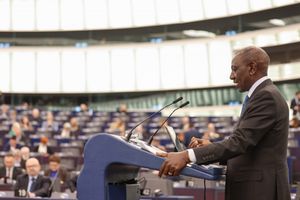Wagner 'unwelcome' in Niger, Ecowas official warns

A woman holds the image of ousted Niger President Mohamed Bazoum, 63, who has been held by coup plotters with his family in his official Niamey residence since July 26, during a protest outside the Niger Embassy, in Paris on August 5, 2023.
The Economic Community of West African States (Ecowas) has expressed concern that Russian private military contractor Wagner could enter Niger to take advantage of last month's coup in Niamey.
And a senior official of the West African bloc said Ecowas would hold Russia to account if the controversial Wagner group entered the country amid the chaos. Wagner has been accused of rights abuses in other countries currently experiencing political upheaval, such as the Central African Republic and Mali.
Abdel-Fatau Musah, the Ecowas commissioner for political affairs, peace and security, issued the warning on Friday, August 11, in Abuja during a local television interview.
"What we are saying is that we will not allow West Africa to become an arena for proxy wars again. And that is our position. It is not our option.
"We do not want private military companies to intervene in the conflict environment in the region because we know the consequences of their actions," he said in a programme on Channels TV, a Nigerian broadcaster.
Ecowas has held two extraordinary meetings since Niger's president, Mohamed Bazoum, was deposed in a military coup on July 26.
In the past, officials have simply warned against outside interference in Niger. But this is the first time the bloc has pointed the finger at Wagner.
Before the coup, however, there were reports that Wagner already had a relationship with Niger's military, as it does in Mali and Burkina Faso, both of which are led by juntas and are suspended members of Ecowas and the African Union for allowing illegal seizures of power.
"The Wagner group is apparently in Mali today. The Malian government says this is an agreement between them and the Russian Federation.
"We want to take them at their word, which means that any kind of human rights violation or devastation in our region by these private military contractors, we will hold the other countries in our region responsible."
"This is Russia (we will hold them responsible), diplomatically. The West African region is simply not Russia".
Wagner's co-founder, Yevgeny Prigozhin, has often used Russia's diplomatic relations with these countries to secure military contracts.
But since June, when the group attempted a mutiny inside Russia, his relationship with President Vladimir Putin has been the subject of debate. Nevertheless, events in and outside Russia could give Wagner and Moscow the deniability they need to conduct covert, controversial business in junta-run countries.
Musah says private military companies have been a feature of the African conflict scene for so many years, beyond just Wagner. And they often go where institutions have collapsed.
"Private military companies were involved in Sierra Leone. They were involved in Liberia during the civil wars a long time ago. And even more recently, in the global conflict, there has been the use of private military companies," he said.
"The Americans are using them in Iraq, they are using them in Afghanistan, and others. What we are seeing is that these groups are not acceptable in Africa, even though they are there, and we are going to hold their countries of origin responsible for any violations".
Musah said Niger's ousted president, Mohamed Bazoum, his wife and son were being held by the country's coup leaders and were living in appalling conditions. The African Union has already condemned the mistreatment and warned that it is unacceptable.
"We will go there if necessary to rescue President Bazoum, who is today living in very bad conditions. He's being denied medical attention, he's being denied even access to his usual food.
"His son, who is also being held, has already lost so many kilos. They are being held in these inhumane conditions and we cannot just sit back and rely on the goodwill of these people who are disrupting the democratic process in the country".
West African chiefs of staff in Ecowas met on Saturday after a summit in which they ordered the deployment of a "standby force" to help resolve the crisis in Niger Republic. But the bloc has largely softened its earlier warning against military intervention in Niger. Local political issues, as well as cultural ties between Nigeria, Ecowas' largest resource contributor, and Niger, have helped to put the brakes on the warning.
Meanwhile, the UN High Commissioner for Human Rights, Volker Türk, has expressed concern about the deteriorating conditions in which Niger's President Bazoum, his wife and son are being held.
According to Farhan Haq, Deputy Spokesperson for the UN Secretary-General, President Bazoum and his family are believed to be living without electricity, water, food or medicine.
Bazoum has been detained since soldiers seized power on 26 July.
The United States would hold the junta that seized power in Niger Republic accountable for the safety of the democratically elected President Mohamed Bazoum, his family, and detained members of the government.
"The United States joins the Economic Community of West African States (Ecowas) in calling for the restoration of constitutional order in Niger," US Secretary of State Antony Blinken said in a statement on Friday.





